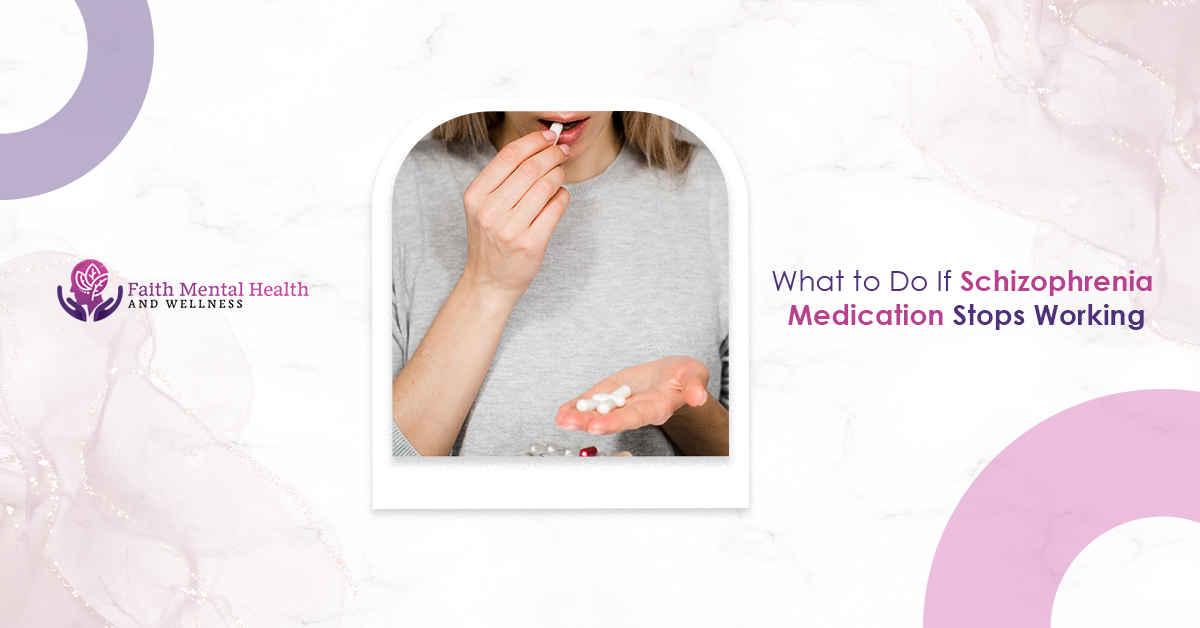Living with schizophrenia can be challenging. However, life will still be rewarding and happy when one has the proper assistance.
Medication, to most individuals, assists in the treatment of conditions such as hallucinations, delusions, and confused thoughts. But sometimes, the medication stops working. It can feel scary and overwhelming.
We understand how difficult these moments can be at Faith Mental Health and Wellness. We offer an accepting and sensitive style of schizophrenia management. We have highly skilled personnel to guide you hand in hand.
Let’s dive into what you can do next.
Why Schizophrenia Medications May Stop Working
Some medications prescribed to treat schizophrenia, like the antipsychotics, can become ineffective with time. It may occur as a result of:
- Missing doses or stopping medicines without medical advice
- Use of alcohol or recreational drugs
- High stress levels or life changes
- Changes in brain chemistry
- Incorrect dosage or interactions with other medications
If your issues arise again or become more severe, you must respond urgently.
Signs Your Schizophrenia Medication Might Not Be Working
Recognizing warning signs assists you in seeking assistance in the early stages of your problem so that more damage is not done. Watch out:
- Hearing voices or seeing things again
- Heightened fear, confusion, or paranoia
- Sleeping or eating problems
- Isolation or failure to take care of oneself
- Having an emotionally dull, fatigued, or depressed feeling
What to Do If Schizophrenia Medication Stops Working
1. Talk to a Doctor or Mental Health Provider
If your schizophrenia medication stops working, the first thing to do is talk to your doctor. Do not stop taking your medicine without help. It could make symptoms worse.
Your provider might:
- Check if you’re taking your medication the right way
- Look for physical health issues that may affect how the medicine works
- Change the dose or try a new medication
- Recommend therapy or other supports
At Faith Mental Health and Wellness, we create individualized treatment plans to help manage symptoms and improve quality of life. Your care plan is made just for you.
2. Don’t Blame Yourself
It’s not your fault if your schizophrenia treatment isn’t working the way it used to. All people are individuals, and bodies tend to alter the way they react to drugs throughout their lives. You should receive kindness and affection, not disrespect.
3. Explore Other Helpful Treatments
Medication is only one part of schizophrenia treatment. Many people benefit from adding:
Therapy & Counseling
Obtain coping strategies, take the stress away, and overcome emotional struggles.
Peer Support Groups
Talk with others who understand what you’re going through. You’re not alone.
Healthy Lifestyle Habits
- Eat nutritious foods
- Get enough rest
- Take walks or do calming activities
- Avoid alcohol and drugs
4. Ask for a Medication Review
A medication review can help your provider:
- Check for side effects
- Spot interactions with other medications
- Recommend better options for your current symptoms
Our Faith Mental Health and Wellness care team includes professionals who can help review and manage your entire medication plan.
5. Keep Track of Symptoms
Keeping a journal or using a simple app can help you and your provider understand what’s working and what’s not.
Track:
- How do you feel each day
- Side effects
- Changes in mood, sleep, or thoughts
- Things that help or trigger symptoms
6. Stay Connected with Family or Caregivers
Engaging with a trusted individual can shift the outcome considerably. Reach out to a relative or caregiver for:
- Remembering to take your medication
- Getting rides to appointments
- Emotional support
- Planning for emergencies
7. Be Ready in Case of a Crisis
When you experience that you are not safe or you are losing control, seek help immediately. You can:
- Call your doctor or therapist
- Reach out to a crisis line
- Go to a hospital if needed
Your safety is the top priority. Help is always available.
What If No Medication Seems to Work?
Some people live with treatment-resistant schizophrenia, where common medications don’t help enough.
In this case, your provider may recommend:
- Clozapine, a special medication, which could be helpful when other medications are not
- Organized help, such as counseling, an outreach group, or case management
- Ongoing care planning, explicitly tailored for complex needs
Faith Mental Health and Wellness supports even the most difficult cases, because you deserve care that works.
Faith Mental Health and Wellness, Here for You
Schizophrenia is a very critical disorder that changes the thought process, feelings, and behavior of an individual.
However, several individuals can lead balanced and fruitful lives with a proper treatment plan and support. In our Faith Mental Health and Wellness, we provide:
- Personalized care plans made for you
- Experienced professionals in schizophrenia treatment
- Telehealth and in-person sessions
- Supportive care at each stage
If schizophrenia treatment stops working, we’re here to help you find a better way forward.
Final Thoughts
When your medication for schizophrenia isn’t helping anymore, it may feel like a setback, but it’s not the end. There are new options, new treatments, and new ways forward.
Contact Faith Mental Health and Wellness today to schedule a consultation.
FAQs
Q: Can schizophrenia ever be cured?
There is no cure. but many people handle their symptoms and enjoy happy lives with therapy.
Q: Is Clozapine safe for everyone?
It works, but it is risky, as a regular blood check is necessary; your doctor will help.
Q: What happens when I have forgotten to take my medication?
Call your provider for advice. Don’t double up or skip a dose without talking to them.

